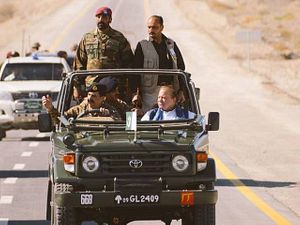Pakistan’s military is seeking a more active and formal role in the administration of the China-Pakistan Economic Corridor, a collection of infrastructure projects in Pakistan supported by $46 billion in Chinese investment. According to the Express Tribune, the Pakistani civilian government has expressed reservations about the military playing a more direct role in the administration of CPEC.
Specifically, the Pakistani army is looking to set up a CPEC Authority, which would be responsible for the execution of CPEC projects. The Pakistani army has already taken a special interest in the China-backed initiative, which was finalized during Chinese President Xi Jinping’s visit to Pakistan one year ago. For example, given general unrest toward the southern reaches of the Corridor, in Balochistan, the army has set up a force comprising 15,000 troops to provide security for Chinese contractors and projects.
Indeed, given Pakistan’s uncertain domestic security situation and the geography of the CPEC route, China would likely be eager to see the Pakistani military play an expanded role. The CPEC corridor runs from the China-Pakistan border in Pakistan-occupied Kashmir, to the Arabian Sea coast. CPEC’s Western Alignment projects involve upgrading road and transportation infrastructure in Balochistan, including near Quetta, a stronghold town for the Afghan and Pakistani Taliban. Gwadar, meanwhile, is imbued with exceptional strategic importance for China, given that it allows access to Indian Ocean sea lanes bypassing the crowded South China Sea and its associated navigational choke points, particularly the Straits of Malacca and Tsunda.
To seasoned observers of Pakistan, that the army would seek a greater share of equity in the administration of CPEC is unsurprising. Pakistan’s army has historically played a dominant role in shaping the country’s foreign and security policy; the country has seen four military coups since its independence in 1947. Lately, the federal government led by Prime Minister Nawaz Sharif has seen its domestic popularity falter. In 2014, widespread protests across the country eroded the prime minister’s power amid claims that his party had won national elections in 2013 through vote-rigging and fraud. Moreover, the recent Panama Papers revelations have implicated Sharif and his family, further enhancing perceptions of malfeasance by the country’s top civilian leader.
Civil-military tensions in Pakistan have grown more pronounced since last year’s formalization of CPEC. Speaking to the Express Tribune and addressing the prospect of a military-led CPEC Authority, Ahsan Iqbal, Pakistan’s minister for planning, development, and reform, noted that the additional bureaucracy would be deleterious to the completion of Corridor projects. “Setting up an authority will mean involving three-dozen more people in decision-making process,” Iqbal told the Pakistani daily. He additionally suggested that existing delays in CPEC projects are due to bureaucratic delays on the Chinese side: “Pakistan has done its part of work and is waiting for approvals from the Chinese side.”
The news that the Pakistani military is seeking to formalize its control over CPEC projects in Pakistan is interesting when read in the context of Chief of Army Staff General Raheel Sharif’s plans to retire later this year. The general (no relation to the prime minister) is widely popular and locking in military control over the most significant infrastructure project in Pakistan’s history would be a formidable legacy.

































